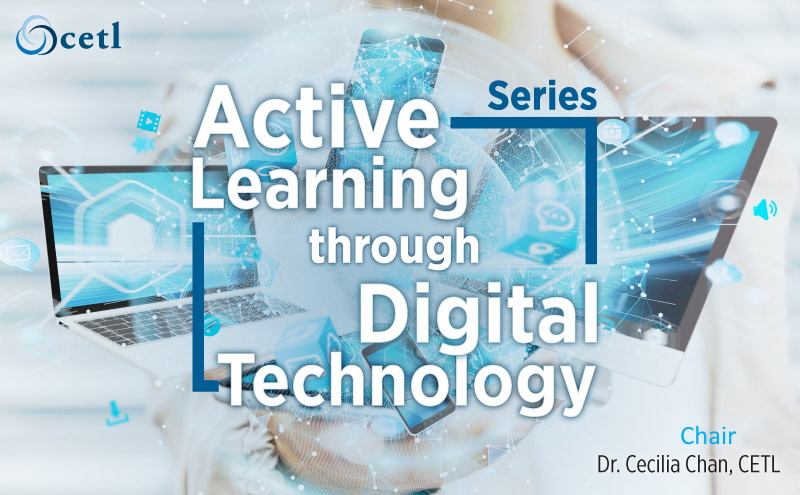Speaker : Prof. Mike Sharples, Emeritus Professor, The Open University, UK
Chair : Dr. Cecilia Ka Yuk Chan, Centre for the Enhancement of Teaching and Learning (CETL)
Organised by Centre for the Enhancement of Teaching and Learning (CETL)

Seminar Series: Active Learning Through Digital Technology
With the continuous renewal of curriculum, digital advancement and sociocultural challenges, we need to find innovative approaches to engage our students in class and out of class. For these reasons, CETL is launching the Active Learning Through Digital Technology series this semester to support teachers. Apart from engaging and motivating student learning, technology enhanced assessment and feedback will also be introduced.
Staff and invited guests only.
For information, please contact:
Mr. Thomas Lau , CETL
Phone: 3917 4807; Email: kanclau@hku.hk
Workshop 1: Practical pedagogy – putting new methods of teaching and learning into practice
Date : 11 February 2020 (Tuesday)
Time : 10:30 am – 12:00 pm
Venue : RR321, Run Run Shaw Building, Main Campus
Speaker : Prof. Mike Sharples, Emeritus Professor, The Open University, UK
Chair : Dr. Cecilia Ka Yuk Chan, Centre for the Enhancement of Teaching and Learning (CETL)
Workshop cancelled.
Abstract
This will be a practical ‘hands on’ workshop. The aim is to explore how you could adopt new ways of teaching and learning at the University of Hong Kong. You will first form into small groups of 2-3 people. Each group chooses and investigates one new method from the book Practical Pedagogy: 40 New Ways to Teach and Learn”. Then, each group teaches that method to another group using the Teachback approach (which I will explain), so that each table of 5-6 people understands two new pedagogies. In the second part, each table discusses how their two pedagogies could be adopted into teaching at the University: its advantages, its limitations, and how those limitations could be overcome.
Seminar 1: Designs for technology-enhanced active learning
Date : 11 February 2020 (Tuesday)
Time : 1:00 pm – 2:00 pm
Venue : RR321, Run Run Shaw Building, Main Campus
Speaker : Prof. Mike Sharples, Emeritus Professor, The Open University, UK
Chair : Dr. Cecilia Ka Yuk Chan, Centre for the Enhancement of Teaching and Learning (CETL)
Seminar cancelled.
Abstract
Higher education is changing, with global competition, online learning, and new technologies such as personalized learning systems. In my talk I propose pedagogy-led active learning as a means to develop higher education for the future. I shall give an overview of effective methods of teaching and learning, with examples of new pedagogies for university education, based on the influential Innovating Pedagogy series of reports from The Open University and Practical Pedagogy: 40 New Ways to Teach and Learn, published by Routledge.
Biography of Prof. Mike Sharples
Visiting Formal Academic Emeritus Professor
Faculty of Wellbeing, Education & Language Studies
Institute of Educational Technology
The Open University, UK
Professional biography
My research involves human-centred design of new technologies and environments for learning. It involves gaining a deep understanding of how people work, play, learn and interact as a foundation for the design of novel socio-technical systems (people in interaction with technology).
I inaugurated the mLearn conference series and was Founding President of the International Association for Mobile Learning. I am Academic Lead at Futurelearn, and co-investigator on the Wolfson OpenScience Laboratory and Juxtalearn projects. Previous projects as Principal Investigator include nQuire: Young Citizen Inquiry, and Personal Inquiry to support inquiry-based learning of science topics between formal and non-formal settings, and a collaboration with Sharp Labs Europe to develop software on mobile phones for incidental language learning. I am Associate Editor in Chief of IEEE Transactions on Learning Technologies. I have authored over 300 papers in the areas of educational technology, science education, human-centred design of personal technologies, artificial intelligence and cognitive science.













